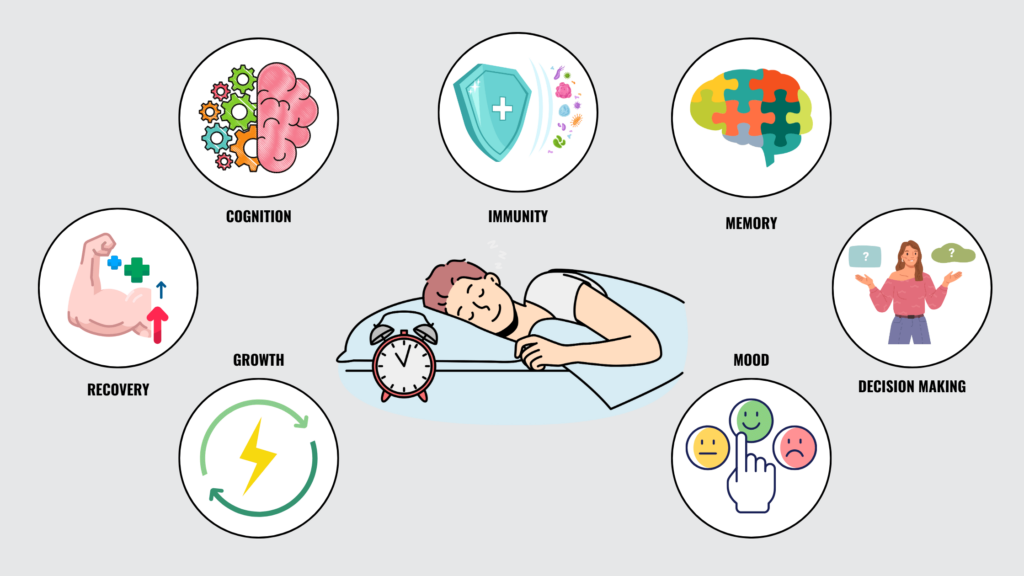In the construction industry, where long hours and intense physical demands are the norm, sleep is often sacrificed to meet deadlines or maintain productivity. However, insufficient rest can have severe consequences for brain health and overall well-being. Inadequate sleep affects cognitive performance, memory, emotional health, and even immunity, with recent research suggesting that chronic sleep deprivation could accelerate brain aging. By understanding the connection between sleep and brain health, individuals in demanding fields can prioritize rest to safeguard their mental and physical wellness.
Quick look
- Sleep supports cognitive functions, emotional regulation, and immunity. Poor sleep can accelerate brain aging and increase the risk of cognitive decline.
- During sleep, the brain clears toxins, and the body repairs muscles, which are crucial for clear-headedness and physical resilience in construction.
- Sleep-deprived brains become more reactive, showing impulsivity and mood instability, which can impact decision-making and communication.
- Chronic sleep deprivation is linked to weakened immunity, delayed muscle repair, and increased vulnerability to illness.
- Prioritize a consistent sleep routine, limit screens before bed, and create a restful sleep environment to improve sleep quality and overall health.
The importance of sleep

Sleep is fundamental to our health, profoundly affecting nearly every body system. It supports cognitive performance, helps the body recover from physical exertion, consolidates memory, enhances immune function, and regulates mood and emotional well-being.
1. Cognitive performance
During sleep, the brain clears toxins accumulated during waking hours, optimizing mental clarity and focus. This process is crucial for construction workers and anyone in fast-paced environments that require clear-headedness and quick thinking. Insufficient sleep can impair these abilities, leading to slower reaction times, decreased accuracy, and a heightened risk of accidents.
2. Recovery
Sleep is a restorative period when the body repairs itself, particularly after physically demanding activities. For construction workers, sleep allows muscles to repair and reduces inflammation, essential for maintaining physical stamina and avoiding injuries. Without enough rest, recovery is hindered, making the body more vulnerable to strains and fatigue.
3. Memory
Sleep plays a crucial role in memory formation. It allows the brain to process and organize information from the day, storing key details for later recall. Skimping on sleep limits this process, potentially impacting learning and retention, which can be detrimental in a field where remembering instructions, safety protocols, and technical details is critical.
4. Immune function
Getting enough rest is vital for a robust immune system, especially during colder months. During sleep, the body produces cytokines and other immune-boosting substances, which help combat illness. Chronic sleep deprivation compromises immunity, leaving the body vulnerable to infections and slowing recovery time, a significant concern for anyone who must be on-site daily and cannot afford sick days.
5. Decision-making and judgment
Sleep affects the brain regions responsible for logical thinking and impulse control. A well-rested brain is more likely to make sound, thoughtful decisions, while a sleep-deprived one may act impulsively or overlook details. Sleep is essential for maintaining safe practices in construction, where even minor missteps can lead to significant consequences.
6. Growth
Sleep supports the release of growth hormone (HGH), aiding tissue repair and cell regeneration. This hormone is vital for those in physically demanding fields to maintain muscle health and energy levels, reducing the risk of burnout and injury from overexertion.
7. Emotional regulation and mood
Sleep is essential for managing mood and emotional resilience. Sleep-deprived individuals are more prone to irritability, anxiety, and stress, factors that can negatively impact work and personal relationships. Adequate rest fosters emotional stability, which is crucial for maintaining positive interactions on and off the job site.
Your brain on no (or limited) sleep
Impaired cognitive function
When the brain is sleep-deprived, cognitive function declines significantly. Studies show that a lack of sleep can lead to issues with concentration, focus, and problem-solving, similar to the effects of alcohol intoxication. Memory processing is also impacted, making retaining new information and recalling important details harder. In a sleep-deprived state, the brain struggles to communicate effectively, leading to slower processing speeds and more frequent mistakes.
Emotional instability and impulsivity
Limited sleep affects the amygdala, the part of the brain responsible for emotions, leading to heightened emotional responses. People experiencing sleep deprivation often find themselves more reactive, with increased feelings of irritability, frustration, and anxiety. Sleep-deprived brains also exhibit impulsivity, which impairs judgment and decision-making. Without sleep, the brain lacks the control to regulate emotional responses, leading to more impulsive reactions and poor conflict resolution.
Slowed reaction times and motor skills
When the body lacks sleep, reaction times and fine motor skills slow. This effect is especially dangerous in high-risk activities like driving, operating machinery, or construction work, where fast responses and accuracy are essential. Studies indicate that the response delay from sleep deprivation can be just as risky as intoxicated driving. Reduced hand-eye coordination and slower reflexes make everyday tasks more challenging, further highlighting the need for quality rest.
Poor decision-making and risk assessment
Sleep-deprived individuals struggle with weighing options accurately and are more likely to make risky or impulsive decisions. Brain scans show decreased activity in the prefrontal cortex, which manages complex thinking, reasoning, and judgment. Poor sleep can make this part of the brain less effective, leading to miscalculations, impaired planning, and a tendency to make more careless choices.
Compromised memory and learning
Sleep plays a crucial role in processing and consolidating new information; without it, memory recall is significantly affected. During deep sleep, the brain solidifies what it has learned and organizes new information. This process is disrupted without enough rest, making it harder to retain facts, skills, and experiences. Recalling names, dates, or details the next day becomes more difficult, as the brain hasn’t had enough time to store and process memories properly.
The link between sleep and brain health and aging

Research published in Neurology emphasizes that poor sleep may accelerate brain aging and contribute to faster cognitive decline. This large-scale study examined how sleep impacts brain structure, primarily focusing on gray matter and neural connectivity, which are critical for memory, reasoning, and decision-making functions. Poor sleep quality was associated with premature aging markers, indicating how crucial sleep is for maintaining cognitive resilience.
Study objectives
The study’s primary goal was to examine whether ongoing sleep disruptions have a measurable impact on brain structure and aging. Specifically, researchers focused on observing if disrupted or low-quality sleep was linked to reduced gray matter and weakened connectivity in areas critical for cognitive tasks.
The study also aimed to determine whether consistent, high-quality sleep could be a protective factor in maintaining brain health and supporting long-term cognitive function.
Outcomes
Results showed that individuals with poor sleep quality had reduced gray matter and lower connectivity in brain regions responsible for memory, reasoning, and executive functions. These reductions suggest that poor sleep may mimic and even accelerate typical brain aging patterns, underscoring sleep as a preventative factor in brain health.
Diminished connectivity and gray matter loss from poor sleep can lead to difficulties with cognitive tasks and increase vulnerability to age-related cognitive conditions. This research highlights the importance of addressing sleep quality as part of a strategy for cognitive health, suggesting that prioritizing good sleep habits can help protect brain function as we age.
Sleep helps the brain rid itself of amyloid plaques, which are associated with neurodegenerative conditions like Alzheimer’s. Without enough rest, these plaques accumulate, potentially accelerating cognitive decline and contributing to brain aging. The brain’s repair mechanisms, which rely on adequate rest to remove waste, are less effective when we sleep poorly, causing an accelerated decline in brain health.
Health conditions linked to a lack of sleep
Chronic sleep deprivation has been linked to an increased risk of cognitive disorders, including Alzheimer’s disease and dementia. Studies have shown that individuals who regularly sleep fewer than six hours a night are more likely to experience cognitive decline than those who get adequate rest.
The connection between sleep and these conditions may stem from the brain’s diminished ability to clear harmful toxins during sleep, creating a cumulative risk for neurodegeneration over time. National Institutes of Health and the American Academy of Sleep Medicine support these findings, emphasizing that good sleep is crucial for long-term brain health.
8 ways to get the sleep you need

Quality sleep can be elusive, especially in busy lives filled with commitments and distractions. However, with some practical adjustments, anyone can create a routine that enhances sleep quality and helps them wake up feeling rested. From creating a calming environment to adjusting daily habits, these small changes can improve sleep duration and quality.
1. Make it a priority
Make sleep a non-negotiable priority. When we start viewing sleep as a foundation for health—rather than something we do only when time allows—improvements in sleep quality often follow. Setting a specific time for bed and giving ourselves at least seven to nine hours to rest helps maintain consistent sleep patterns. Making sleep a top priority might require scheduling activities earlier in the evening, but it’s well worth it for the health benefits that follow.
2. Consistent bedtime routine
A consistent bedtime routine supports the body’s natural circadian rhythm, helping the body know when it’s time to wind down. Going to bed and waking up at the same time every day, even on weekends, helps regulate the internal body clock. When we set a consistent schedule, our body can better prepare for rest by starting to produce melatonin, the sleep hormone, at the same time each evening. This regularity promotes easier, deeper sleep, reducing the chances of lying awake.
3. Curb electronics/screens before bed (2-3 hours)
Electronic devices like smartphones, tablets, and TVs emit blue light that interferes with melatonin production. Avoiding screens 2-3 hours before bed makes it easier to fall asleep faster and wake up less at night. If using electronics in the evening is unavoidable, setting devices to night mode or using blue light-blocking glasses can help limit their impact on sleep. Reducing screen time also promotes relaxation, allowing the brain to ease into a restful state.
4. Use red lights
Red lights are beneficial for evening use because they minimize the blue light exposure that suppresses melatonin production. Dimming the lights in your home and switching to red-hued lights about an hour before bedtime helps signal your brain that it’s time to prepare for sleep. Research finds that red or amber lighting is the most conducive to melatonin production, supporting a smoother transition into sleep. Additionally, red light exposure can create a calm, soothing environment conducive to winding down.
5. Wear loose/breathable clothing and reduce room temperature
Wearing breathable, loose-fitting clothing and keeping the room temperature between 60-67°F supports the body’s natural cooling process. Lowering body temperature promotes the body’s transition into the deep sleep stage, helping you feel more rested upon waking. In addition to clothing and room temperature, light bedding and good airflow also help maintain an ideal sleeping environment. Keeping the room cool but comfortable can significantly affect sleep quality.
6. Relaxation techniques
Calming activities like deep breathing, meditation, or progressive muscle relaxation can ease stress and help the mind transition into sleep mode. Deep breathing activates the body’s relaxation response, lowering heart rate and releasing tension. Yoga or gentle stretching exercises help relieve physical tension, while visualization or guided meditation can calm a busy mind. Including these techniques in a nightly routine can gradually improve sleep quality and duration by helping the body naturally prepare for rest.
7. Avoid caffeine, alcohol, and heavy meals before bed
Caffeine and alcohol disrupt sleep quality by interfering with the natural sleep cycle, while heavy meals before bed can cause discomfort and indigestion. Caffeine, found in coffee, tea, soda, and dark chocolate, should ideally be avoided at least six hours before bed to prevent lingering effects on alertness. Similarly, alcohol may initially make one feel drowsy, but it disrupts deep sleep later in the night. Instead of caffeine or heavy meals, a light snack consisting of protein and fat can help sustain energy through the night without impacting blood sugar and sleep.
8. Create a sleep sanctuary
Designing a bedroom that fosters relaxation and tranquility can substantially improve sleep quality. Using blackout curtains, minimizing light sources, and removing clutter can create a calm space without distractions. In addition, calming colors, soft textures, and some soothing scents like lavender create an environment that encourages deep relaxation. By cultivating a space exclusively for rest and relaxation, the brain will associate the bedroom with sleep, making it easier to unwind and drift off.
Bottom line
Sleep is a powerful, natural tool for maintaining brain health, emotional stability, and overall well-being. Prioritizing sleep can have lasting benefits, from improving cognitive performance to reducing the risk of cognitive decline. For construction professionals who face intense physical demands daily, quality rest is essential to maintain safe, effective, and healthy practices on the job.
To learn more about how the construction industry can support well-being, subscribe to our newsletter and stay up-to-date on our latest content.


